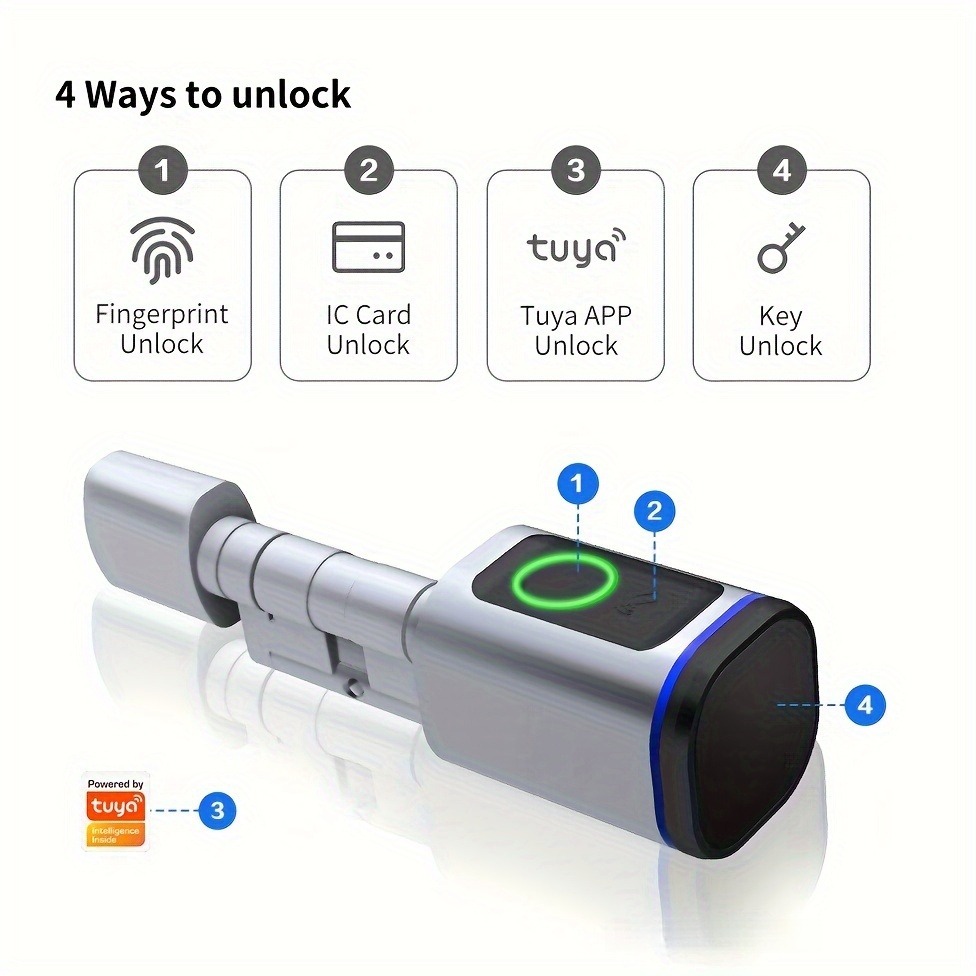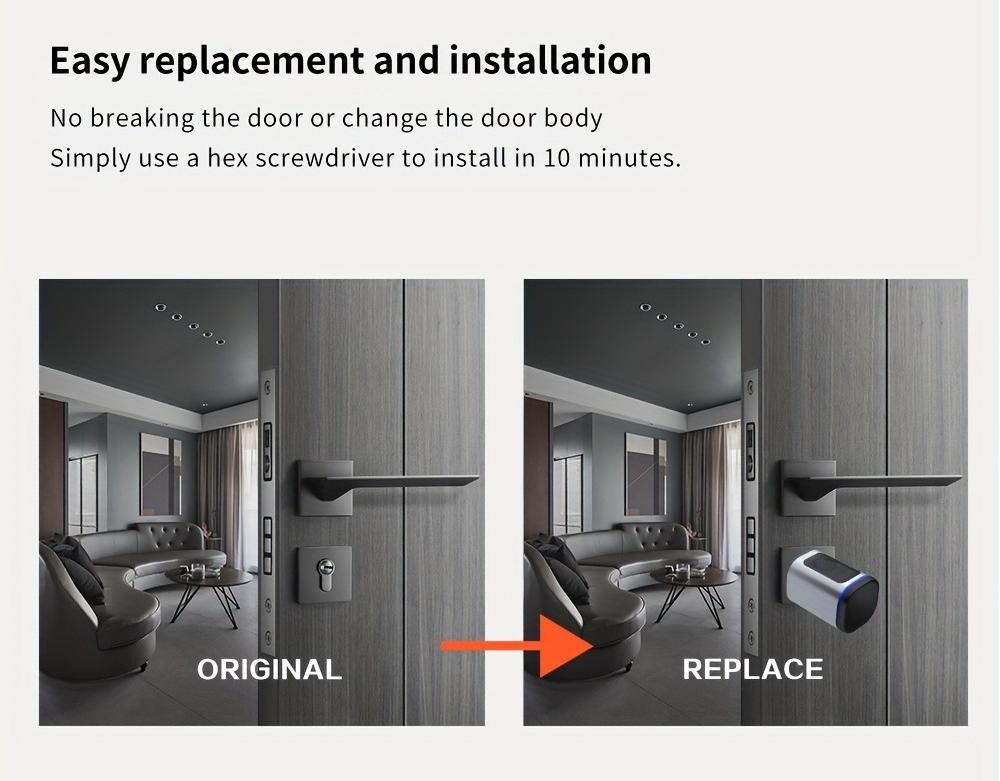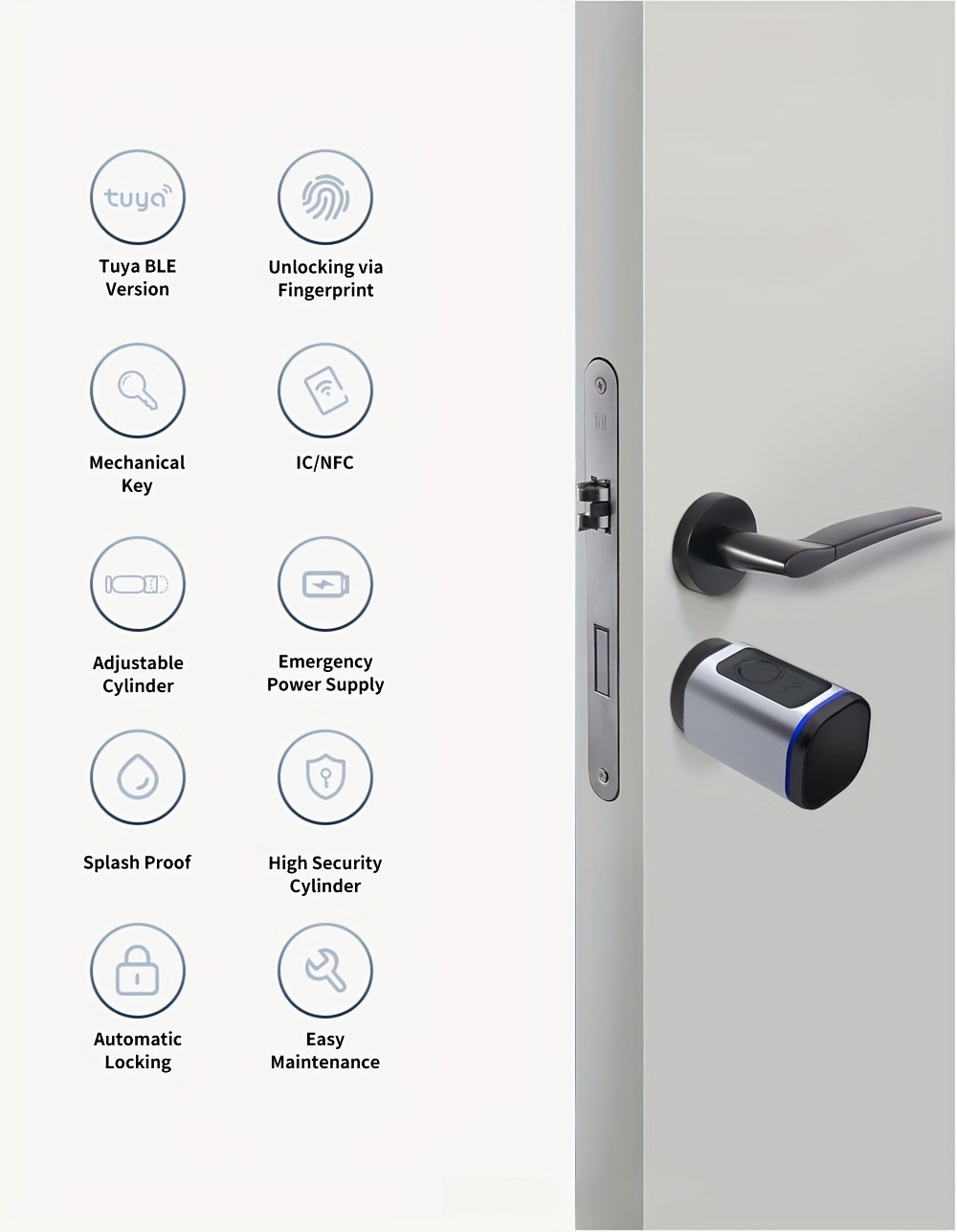Is a Smart Lock Right for You or Stick with Traditional Locks

Smart locks offer you keyless convenience and advanced features that enhance your home security. With options like keyless entry and smartphone management, they cater to your modern lifestyle. However, some users may find traditional locks to be more reliable and straightforward. As you consider your security needs, think about how each option aligns with your daily routine and preferences.
Key Takeaways
Smart locks let you enter without keys and control them from far away. This makes life easier today.
Traditional locks are dependable and don’t need electricity, so they work even when the power is out.
Think about how much money you can spend; smart locks usually cost more at first but can save money on lost keys.
Check how comfortable you are with technology; traditional locks are easy to use, while smart locks might need some learning.
Look at security features; smart locks have advanced options, while traditional locks give basic protection.
Key Differences Between Smart and Traditional Locks

When choosing between a smart lock and traditional locks, understanding the key differences can help you make an informed decision. Here’s a breakdown of how these two types of locks compare:
Feature | Smart Locks | Traditional Locks |
|---|---|---|
Convenience | You need physical keys for access, which can be inconvenient. | |
Security Features | Benefit from advanced features like alarms, cameras, and integration with security systems. | Limited built-in security measures may not deter determined intruders. |
Vulnerability | While they offer convenience, smart locks can be susceptible to hacking risks. | Traditional locks are more vulnerable to lock picking and bumping. |
Cost | Expect a higher initial cost due to technology and features. | Generally more affordable with lower upfront costs. |
Technology | Requires batteries or electric power, which can be a consideration during outages. | Does not rely on any external power source, ensuring reliability. |
Additionally, smart locks offer remote access and monitoring features, while traditional locks do not. You can integrate smart locks with other smart home devices, enhancing your home automation. On the other hand, traditional locks are simpler and do not require power, making them reliable during outages.
Statistics show that 38.9% of locksmiths consider smart locks as the top technology important to their business. Furthermore, 75% of property managers find smart door locks appealing for minimizing key replacement costs. These insights highlight the growing trend towards smart locking solutions.
Ultimately, understanding these key differences can guide you in selecting the right locking system for your needs. Whether you prioritize convenience, security, or reliability, knowing what each option offers will empower you to make the best choice.
Pros of Smart Locks
Smart locks offer numerous advantages that can significantly enhance your home security and convenience. Here are some key benefits you should consider:
Keyless Entry: Say goodbye to fumbling for keys. With a smart door lock, you can unlock your door using a smartphone app or a fingerprint. This feature provides quick access, especially when your hands are full.
Remote Capability: Imagine being able to control your locks from anywhere. Smart locks allow you to lock or unlock your door remotely. This is particularly useful if you need to grant access to guests or service providers while you're away.
Enhanced Security Features: Many smart locks come equipped with advanced security features. You can receive alerts when someone enters or exits your home. Some models even integrate with security cameras and alarms, creating a comprehensive security system.
Integration with Smart Home Systems: Smart locks often work seamlessly with other smart home devices. This compatibility allows you to create automated routines, such as locking your doors when you leave home or unlocking them when you arrive.
User Management: You can easily manage access for family members, friends, or guests. Smart locks allow you to create temporary codes for visitors, ensuring they can enter without needing a physical key. This feature is especially beneficial for rental properties or homestays.
Growing Demand: The popularity of smart locks is on the rise. Consumers increasingly seek features like remote monitoring and automation as part of their home security solutions. This trend reflects a broader shift towards smart home technology, making smart locks a valuable investment.
By choosing a smart lock, you embrace a premium keyless experience that enhances your home security while providing unmatched convenience. With the right smart lock, you can enjoy peace of mind knowing that your home is secure and accessible only to those you trust.
Cons of Smart Locks
While smart locks offer many benefits, they also come with notable drawbacks that you should consider before making a decision. Here are some key concerns:
Reliability Issues: Smart locks depend on technology, which can fail. The National Institute of Standards and Technology reports that 15% of electronic devices fail each year due to battery issues. This raises questions about the reliability of smart locks, especially during power outages. In 2022, the U.S. Energy Information Administration recorded 1.4 billion customer-hours of power outages, averaging 7 hours per customer. Such outages can disable your smart door lock, potentially locking you out of your home.
Cybersecurity Vulnerabilities: Smart locks can be susceptible to hacking. A recent study found that 22 out of 24 smart home devices reviewed had significant vulnerabilities. This indicates a systemic issue in design. Additionally, smart devices can be remotely disabled during a break-in, preventing alerts and capturing crucial information about intruders. If your smart lock loses connection, you may find yourself unable to lock your doors remotely, which highlights a critical flaw in relying on constant internet access.
Cost Considerations: Smart locks typically come with a higher price tag compared to traditional locks. While you may appreciate the advanced features, the initial investment can be a deterrent for some homeowners.
User Complexity: Not everyone is comfortable with technology. If you prefer simplicity, the learning curve associated with smart locks may be frustrating. You might find managing access codes and app settings cumbersome, especially if you are not tech-savvy.
Pros of Traditional Locks
Traditional locks offer several advantages that make them a reliable choice for securing your home. Here are some compelling reasons to consider traditional locks:
Simplicity: You can easily use traditional locks with physical keys. There’s no need to worry about technology or battery life. Just insert the key and turn it to unlock your door. This straightforward approach appeals to many homeowners who prefer a hassle-free experience.
Reliability: Traditional locks, such as mechanical deadbolts, do not rely on electricity or internet connectivity. This means they remain functional during power outages or technical failures. You can trust that your lock will work when you need it most.
Cost-Effective: Generally, traditional locks are more affordable than smart locks. You can find high-quality traditional deadbolts at a fraction of the price of their smart counterparts. This makes them an attractive option for budget-conscious homeowners.
Security: Many traditional locks provide robust security features. Mechanical deadbolts, for example, offer strong resistance against forced entry. You can feel confident knowing that your home is protected by a reliable locking mechanism.
Familiarity: Most people are accustomed to using physical keys. You won’t have to learn new technology or navigate apps. This familiarity can be comforting, especially for those who may not be tech-savvy.
Less Maintenance: Traditional locks require minimal maintenance compared to smart locks. You don’t have to worry about software updates or battery replacements. A simple lubrication of the lock mechanism is often all that’s needed to keep it functioning smoothly.
Cons of Traditional Locks
While traditional locks have their merits, they also come with significant drawbacks that you should consider. Here are some of the main concerns:
Vulnerability to Break-Ins: Traditional locks can be easy targets for burglars. Statistics show that 55.7% of burglars use forcible entry methods. If your home lacks additional security measures, it becomes 300% more likely to be targeted. This data highlights the risks associated with relying solely on traditional locks for security.
Outdated Technology: Many traditional locks use older mechanisms that may not provide the best protection. For instance, the Sherlock lock retains the same key for a few minutes after unlocking, increasing vulnerability to attacks. In contrast, smart locks like the Nuki change the key immediately after unlocking, eliminating this window of opportunity for potential burglars.
Limited Features: Traditional locks lack the advanced features found in smart locks. You miss out on benefits like remote access, alerts, and user management. Without these features, you may find it challenging to monitor who enters or exits your home.
Physical Keys: Relying on physical keys can be inconvenient. You may lose your keys or forget them inside your home, leaving you locked out. Additionally, if you need to grant access to someone, you must either be present or make arrangements to hand over a key.
Maintenance and Wear: Traditional locks can wear down over time. You may need to replace them more frequently than you would a smart lock, which often comes with durable materials and technology designed for longevity.
Factors to Consider When Choosing a Lock
When selecting a lock for your home, several factors can influence your decision. Understanding these elements will help you choose the best option for your needs. Here are some key considerations:
Security Features: Evaluate the security features of both smart locks and traditional locks. Smart locks often come with advanced features like remote access and alerts. Traditional locks may offer robust mechanical protection but lack modern technology.
Cost: Consider your budget. Smart locks typically have a higher upfront cost due to their technology. Traditional locks are generally more affordable. Compare the long-term value of each option. For instance, investing in a high-quality smart lock may save you money on key replacements and enhance your home’s security.
Durability: Look for locks that can withstand wear and tear. A Grade 1 deadbolt, for example, can endure 10 strikes of 75 pounds and up to 1 million cycles. In contrast, a Grade 2 deadbolt offers moderate durability with a lower cost. Assess how often you expect to use the lock and choose accordingly.
Ease of Use: Think about how comfortable you are with technology. Smart locks provide keyless convenience, but they require a smartphone or app for access. Traditional locks use physical keys, which may be simpler for some users.
Access Control: If you frequently have guests or service providers, consider how each lock manages access. Smart locks allow you to create temporary codes for visitors, while traditional locks require you to hand over physical keys. This flexibility can enhance your home’s convenience.
Installation: Determine whether you prefer a DIY installation or professional help. Some smart locks are straightforward to install, while others may require technical expertise. Traditional locks usually offer easier installation, making them a good choice for those who want a quick setup.
To make an informed decision, you can use decision-making frameworks like the Analytic Hierarchy Process (AHP). This structured technique helps you evaluate multiple criteria, such as cost, quality, and security features, when comparing lock security options.
By considering these factors, you can choose a lock that meets your security needs and fits your lifestyle. Whether you opt for a smart lock or traditional locks, prioritize the protection of your home.
Feature Comparison of Smart Door Locks and Traditional Locks

When deciding between smart door locks and traditional locks, you should consider several key features that set them apart. Here’s a comparison to help you understand what each option offers:
Access Method:
Smart locks allow you to lock and unlock your door remotely using a smartphone app. This feature provides convenience, especially when your hands are full or when you’re away from home.
Traditional locks require physical keys for access. You must carry keys with you, which can be inconvenient if you forget them or misplace them.
Power Dependency:
Smart locks need power, either from batteries or electricity. This dependency means you must monitor battery levels to ensure your lock remains functional.
Traditional locks do not rely on any power source. They work consistently, even during power outages, giving you peace of mind.
Security Features:
Many smart locks come equipped with advanced security features, such as sensors and cameras. These enhancements provide notifications for access and can integrate with your smart home system.
Traditional locks typically lack these advanced features. While they can provide basic security, they may not deter determined intruders as effectively as smart locks.
Cost Considerations:
Smart locks often come with a higher initial cost due to their technology and features. However, the investment may pay off in convenience and enhanced security.
Traditional locks are generally more affordable. They offer a cost-effective solution for those who prioritize simplicity and reliability.
User Experience:
Smart locks offer a modern experience with user management options. You can create temporary access codes for guests, making them ideal for rental properties.
Traditional locks provide a familiar experience. Most people know how to use them without needing to learn new technology.
Choosing between a smart lock and traditional locks requires careful consideration of your unique needs. Start by evaluating your security requirements. If you prioritize advanced features and convenience, a smart lock may be the right choice. However, if you value simplicity and reliability, traditional locks could be more suitable.
Consider your budget as well. Smart locks often come with a higher initial cost but may save you money in the long run by reducing key replacement expenses. Remember, the goal is to enhance your home security while ensuring you’re not getting locked out. Weigh these factors to make an informed decision that aligns with your lifestyle.
FAQ
What is a smart lock?
A smart lock is a keyless locking system that allows you to unlock your door using a smartphone app, fingerprint, or keypad. It offers convenience and advanced security features, making it ideal for modern living.
Are smart locks safe?
Yes, smart locks can be safe when you choose reputable brands and follow best practices. They often include encryption and alerts for unauthorized access, enhancing your home security.
How do I install a smart lock?
Installing a smart lock is usually straightforward. Most models come with detailed instructions. You can often do it yourself, but some may require professional installation for optimal performance.
Can I still use a key with a smart lock?
Many smart locks offer a backup key option. This feature allows you to use a physical key if the smart technology fails or if you prefer traditional access.
How do I maintain a smart lock?
To maintain your smart lock, regularly check battery levels and update the software as needed. Clean the lock and ensure it operates smoothly to prolong its lifespan.
